Why Ecommerce Businesses Need Specialized Accounting
Ecommerce accounting services are specialized financial management solutions designed specifically for online businesses selling products or services through platforms like Shopify, Amazon, and other marketplaces.
"If you do build a great experience, customers tell each other about that. Word of mouth is very powerful." — Jeff Bezos
For quick reference, here are the top ecommerce accounting services compared:
Service comparison:
- Finaloop: Starting at $399/month. Best for all-in-one automation. Key feature: books delivered in 36 hours.
- Acuity: Custom pricing. Best for multi-state sellers. Key feature: sales tax nexus expertise.
- Whiz Consulting: Custom pricing. Best for high-volume businesses. Key feature: 15,000+ reconciliations monthly.
- LedgerGurus: Custom pricing. Best for inventory-heavy sellers. Key feature: A2X + QuickBooks integration.
- EcomBalance: Starting at $399/month. Best for growing brands. Key feature: free first-month trial.
- Bean Ninjas: Custom pricing. Best for global sellers. Key feature: Xero specialization.
Running an online store comes with unique financial challenges that traditional accounting methods weren't designed to handle. From managing revenue across multiple sales channels to keeping track of inventory costs and navigating complex sales tax requirements across dozens of jurisdictions, ecommerce sellers face a distinct set of accounting problems.
Unlike brick-and-mortar businesses, ecommerce operations deal with:
- Platform fees that must be separated from gross revenue
- High transaction volumes across multiple channels
- Complex inventory and COGS tracking requirements
- Sales tax obligations in numerous states or countries
- Frequent returns, refunds, and chargebacks
The right accounting partner doesn't just keep your books clean — they provide strategic insights that help you understand your true profitability, optimize inventory investments, and make data-driven growth decisions.
As you grow from a single-channel seller to a multi-platform brand, having accurate financial data becomes increasingly critical. Whether you're selling on Shopify, Amazon FBA, or running a direct-to-consumer operation, specialized ecommerce accounting services can transform your financial data from a headache into your greatest competitive advantage.
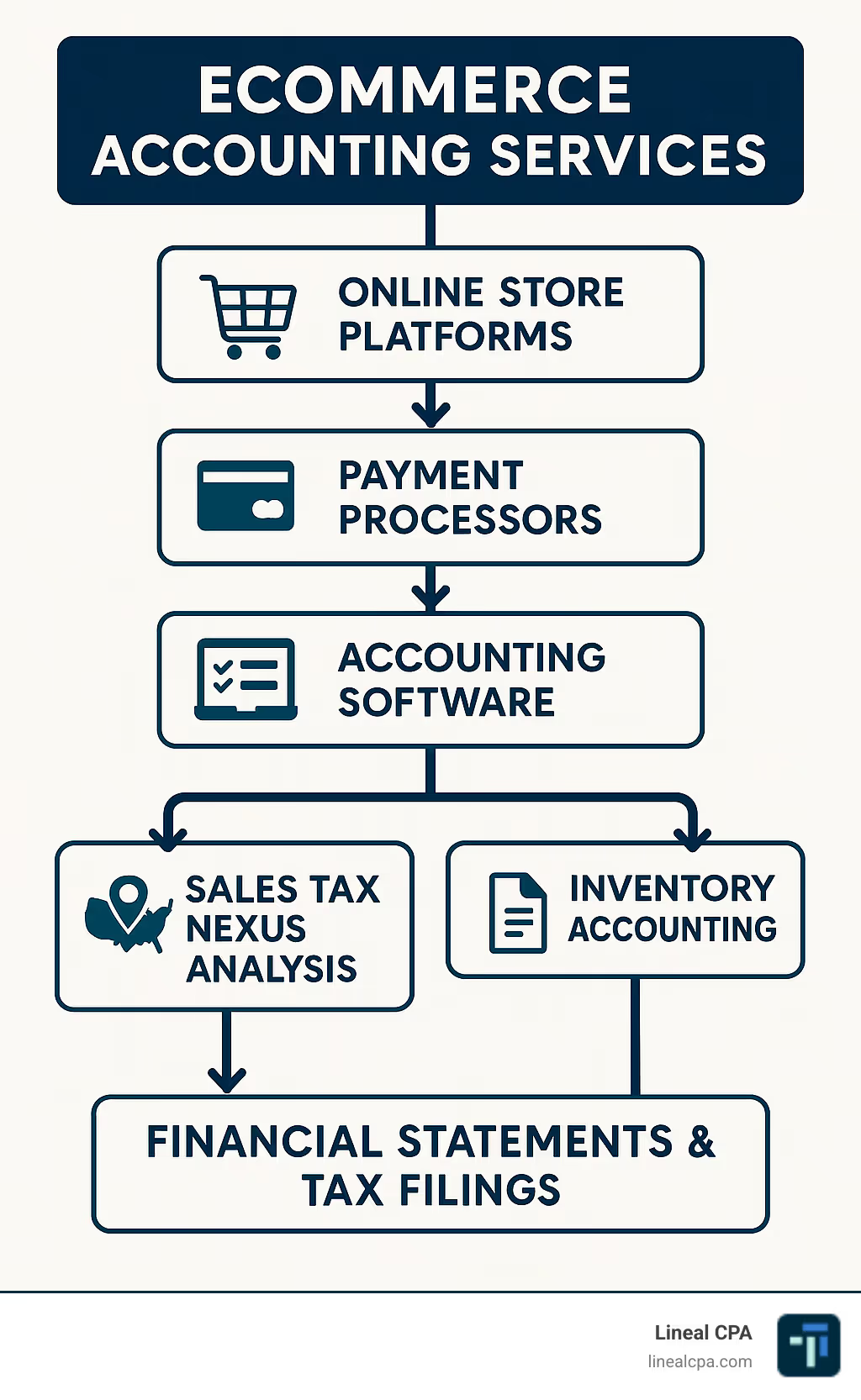
Why Specialized Ecommerce Accounting Matters
Running an online store isn't just about selling products — it's about understanding your numbers. And those numbers? They're a whole different animal compared to traditional retail accounting. Let's explore why ecommerce accounting services are absolutely essential for your online business success.
Revenue Recognition Challenges
When you sell something in a physical store, the math is simple: money in the register equals revenue. But in ecommerce? What hits your bank account is more like a financial mystery novel.
That deposit from Shopify or Amazon isn't your actual revenue — it's a net figure after they've subtracted platform fees, payment processing charges, shipping costs, and those pesky refunds and chargebacks.
One ecommerce accountant put it perfectly: "What looks like $10,000 in your bank account might represent $15,000 in actual sales after all the fees are properly accounted for." Without sorting this out correctly, you'll never truly understand your profit margins, and you might be making business decisions based on incomplete information.
Inventory Accounting Complexities
If you're selling physical products, the IRS has some specific requirements you can't ignore. Their guidelines are clear: merchants selling merchandise must maintain inventory records and use accrual accounting for purchases and sales.
This means when you buy $5,000 worth of inventory, you can't immediately count that as an expense. Instead, it sits on your balance sheet as an asset until you actually sell those items — only then does it become a cost of goods sold (COGS) expense on your income statement.
Your choice of inventory valuation method (FIFO, LIFO, or weighted average) can significantly impact your tax bill. And if you need to write off damaged or obsolete inventory, you'd better have your documentation in order when the IRS comes knocking.
Multi-Channel Integration Headaches
Most successful ecommerce businesses don't put all their eggs in one basket. You're likely selling across multiple platforms — perhaps Shopify, Amazon, eBay, Walmart, and your own website. Each platform has its own reporting system, fee structure, and payout schedule.
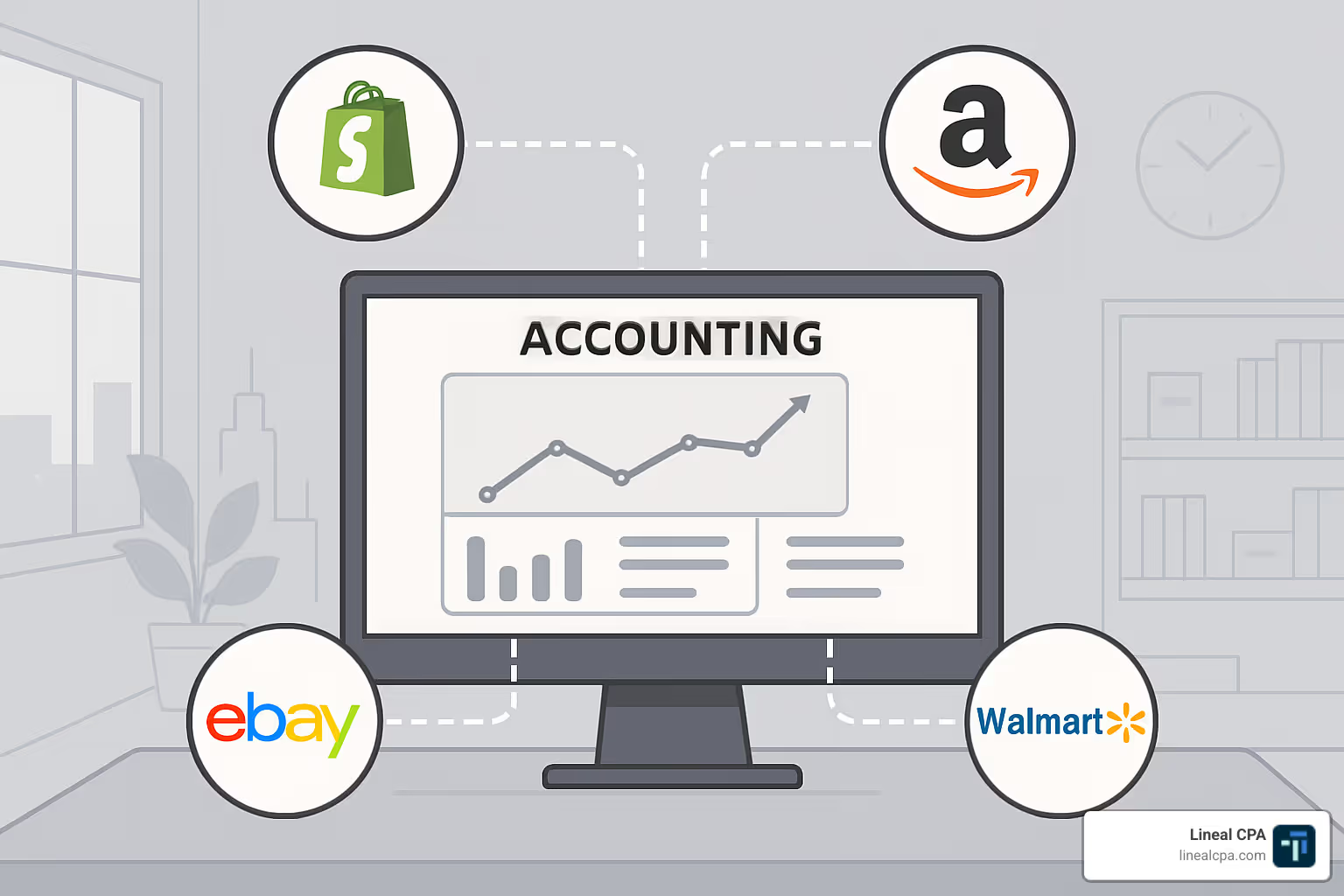
Good ecommerce accounting services bring order to this chaos by automatically consolidating your sales data from all channels, reconciling payment processor statements with platform reports, and giving you one clear financial picture. They can even help you identify which channels deliver the best profit margins so you can focus your efforts where they count.
Sales Tax Nexus Nightmares
If there's one thing that keeps ecommerce entrepreneurs up at night, it's sales tax compliance. Since the 2018 Supreme Court ruling in South Dakota v. Wayfair, online sellers can be required to collect and remit sales tax in states where they have "economic nexus" — even without having a physical presence there.
Each state sets its own thresholds and requirements, creating a complex web of compliance obligations. And if you're an Amazon FBA seller? Storing inventory in Amazon's fulfillment centers creates physical nexus in potentially 22+ states, each with different filing requirements and deadlines.
As one ecommerce accounting service provider explains: "Many sellers don't realize they're responsible for sales tax in states where Amazon stores their inventory — until they get a notice from the state tax authority."
How ecommerce accounting services drive growth
Beyond just keeping you compliant and accurate, specialized accounting can actually fuel your business growth in several key ways:
Gross-Margin Insights help you understand the true profitability of each sale by breaking out all associated costs — product cost, shipping, platform fees, and advertising. Many sellers are shocked to find certain products they thought were profitable are actually losing money once all costs are properly allocated.
SKU-Level Profitability tracking allows you to zoom in on individual product performance. Instead of guessing which products to restock or promote, you'll know exactly which items are your stars and which are dragging down your profits. One seller shared: "I found my 'bestseller' was actually my least profitable product after accounting for returns and advertising costs!"
Fundraising Readiness becomes crucial if you're looking to scale. Investors and lenders want to see clean, accurate books that follow GAAP (Generally Accepted Accounting Principles). Professional ecommerce accounting services prepare your financial data for scrutiny, making fundraising processes smoother and more successful.
Who should consider ecommerce accounting services?
While specialized accounting benefits all online sellers, certain business types have particularly pressing needs:
Shopify Sellers juggle multiple payment providers (Shopify Payments, PayPal, Shop Pay installments) and need help properly reconciling sales with bank deposits. Plus, app subscription fees, shipping costs, and refunds must be correctly categorized.
Amazon FBA Sellers face Amazon's complex fee structure combined with inventory storage across multiple states, creating unique accounting and tax challenges. FBA sellers particularly benefit from help with Amazon settlement report reconciliation and understanding sales tax nexus in FBA states.
Dropshippers deal with timing challenges between sales recognition and supplier payments. Proper accrual accounting ensures financial statements accurately reflect the business's performance despite these timing differences.
DTC Brands with their own websites plus marketplace presence need unified financial reporting that shows the complete picture across all channels, while properly allocating shared costs like advertising and overhead.

According to scientific research on inventory accuracy published in the Journal of Operations Management, businesses with proper inventory accounting systems experience 23% less stockouts and 18% lower carrying costs — tangible benefits that go straight to your bottom line.
Good accounting isn't just about satisfying the IRS — it's about giving yourself the financial clarity to make smart business decisions that drive profitable growth.
Common Pain Points & Pro Solutions
Running an online store brings a unique set of financial headaches that traditional accounting methods weren't built to handle. Let's look at the most common challenges and how specialized ecommerce accounting services can turn these problems into opportunities.
High Transaction Volume
That exciting "ka-ching" notification sound can quickly become overwhelming when you're processing hundreds or thousands of orders daily. Imagine manually entering each sale into QuickBooks — you'd never leave your desk!
Professional solution? Automation is your new best friend. Rather than drowning in individual transactions, services like A2X can post daily or weekly summary entries while maintaining all the detail you need for tax purposes. One seller told us, "I went from spending Sundays on bookkeeping to actually seeing my family again," after implementing automated integration between their Shopify store and accounting system.
Platform Fees and Payment Processing
When you sell a $50 product on Shopify or Amazon, that full $50 rarely hits your bank account. Instead, you see a net deposit after various fees are deducted. This creates a messy situation for understanding your true profitability.
Ecommerce accounting services solve this by creating custom chart of accounts structures that properly separate these fees. By breaking out Shopify platform fees, payment processing costs, and shipping expenses into distinct categories, you gain crystal-clear visibility into your actual gross margins. This insight alone can reveal which products and channels deserve more of your attention — and which ones might be secretly losing money.
Returns & Chargebacks
Online shopping comes with higher return rates than brick-and-mortar retail — plus the added joy of credit card chargebacks. These moving pieces make tracking your actual revenue surprisingly complex.
Professional accountants implement proper accrual methods that establish reserves for returns based on your historical data. They also create specialized processes to track chargebacks through their entire resolution cycle. This means your financial statements actually reflect reality, not just hopeful thinking. As one Shopify seller put it: "I finally stopped wondering where my money went."
Multi-State Sales Tax Compliance
The 2018 South Dakota v. Wayfair decision created a nightmare scenario for many online sellers — suddenly, you might need to collect and remit sales tax in dozens of states, each with different rules and filing schedules.
Ecommerce accounting services tackle this by conducting thorough state-by-state nexus studies and integrating with specialized tax software like TaxJar or Avalara. They manage your entire filing calendar and ensure you're collecting the right amounts. One accounting firm recently shared: "We detected and corrected understated revenue in a client's sales tax software, preventing what would have been significant audit penalties."
Currency Conversions and International Sales
Expanding globally introduces a whole new layer of complexity with currency conversions, VAT/GST requirements, and international tax considerations. What should be exciting growth can quickly become a compliance headache.
Specialized accountants implement multi-currency systems that properly track foreign exchange gains and losses while partnering with international tax experts to keep you compliant in each market. This global expertise allows you to focus on selling worldwide without worrying about tax authorities from other countries knocking on your door.
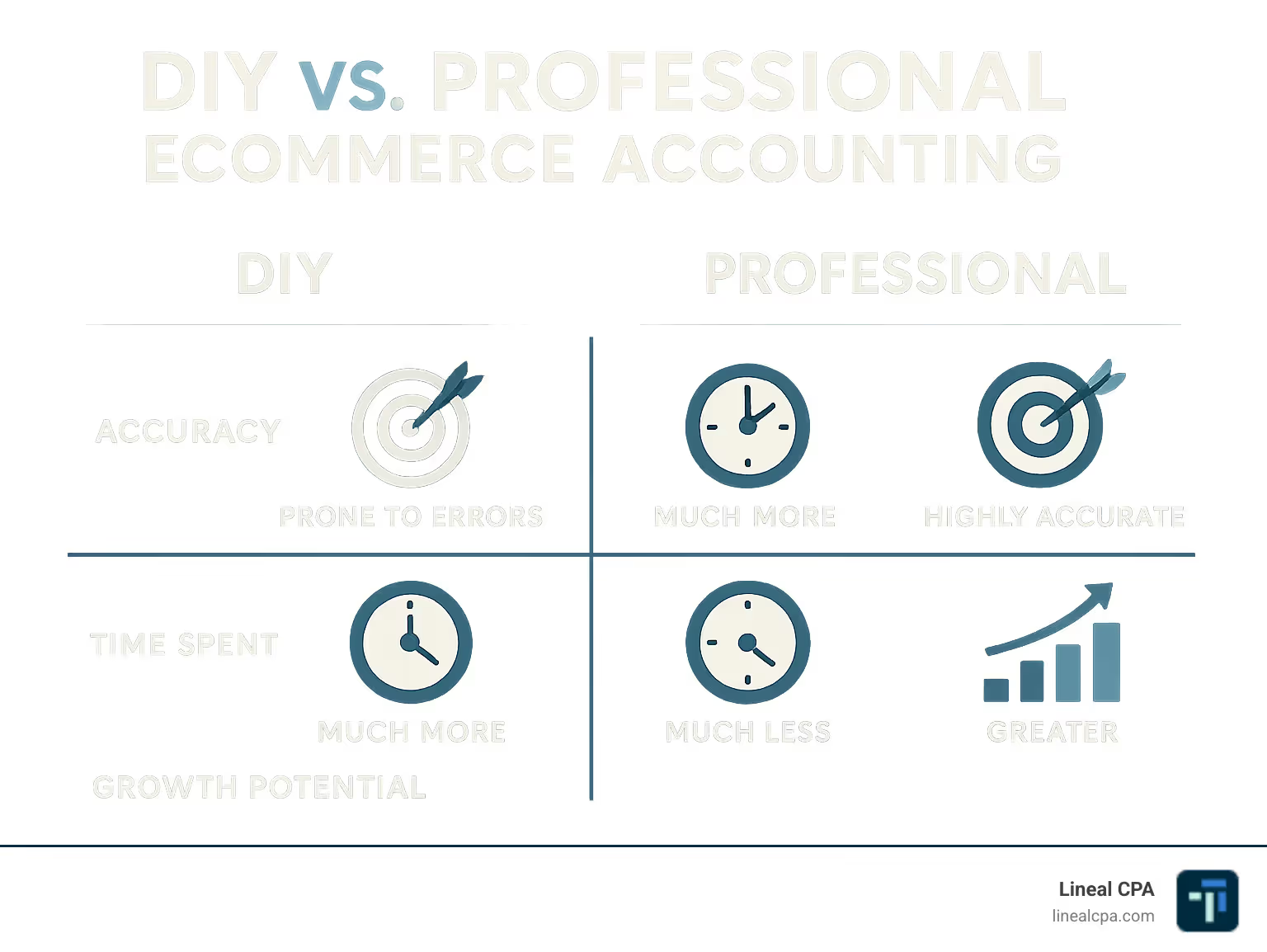
DIY BookkeepingOutsourced Expert Team10-15 hours weekly spent on bookkeeping1-2 hours weekly reviewing reportsHigh risk of errors in platform reconciliationAutomated reconciliation with 99%+ accuracyLimited visibility into true profitabilityClear SKU and channel-level profit analysisReactive tax complianceProactive tax planning and complianceBasic financial statements onlyAdvanced KPIs and growth metricsLimited scalabilityGrows with your business$0 direct cost (but high opportunity cost)$399-$2,000+ monthly investment
The truth is, while DIY bookkeeping might seem free, the hidden costs are substantial — both in time spent and missed opportunities. Most successful ecommerce entrepreneurs eventually reach the same conclusion: their time is better spent growing the business than reconciling payment processor statements.
For more specialized guidance on managing your online store's finances, check out our detailed guide on E-Commerce Bookkeeping Services.
Best Ecommerce Accounting Services at a Glance
When you're searching for the perfect ecommerce accounting service, finding one that fits your unique business needs can feel overwhelming. Let's break down what the top providers offer so you can make an informed choice that helps your online store thrive.
Think of your accounting partner as the financial co-pilot for your ecommerce journey. The right service doesn't just track numbers — it transforms those figures into growth strategies custom to your business.
Most providers structure their pricing based on your monthly revenue, with entry-level packages starting around $399 for smaller shops doing under $20K monthly. As your business scales, so will your investment:
For businesses processing $20K-$100K monthly, expect to invest $500-$1,000 per month in professional accounting support. Mid-sized operations ($100K-$500K monthly) typically pay $1,000-$2,500, while larger enterprises exceeding $500K monthly revenue invest $2,500+ for comprehensive financial management.
What makes ecommerce accounting services worth this investment? Beyond basic bookkeeping, you're gaining access to specialized expertise in the unique challenges online sellers face.
The best providers offer seamless connections with your entire tech stack. Your financial data should flow automatically from Shopify, Amazon, eBay, or Walmart into your accounting system. The same goes for payment processors like Stripe and PayPal, your inventory management system, shipping solutions, and tax compliance software.
For product sellers, inventory tracking capabilities are non-negotiable. Look for services that give you crystal-clear visibility into your COGS by individual SKU, provide accurate inventory valuation reporting, help manage write-offs for damaged goods, and integrate smoothly with your 3PL warehouses if you use them.
Many providers go beyond the numbers to offer strategic guidance that can dramatically impact your bottom line. These advisory services might include cash flow forecasting (essential for inventory-heavy businesses), pricing strategy optimization to maximize margins, guidance on securing growth financing, and even exit planning when you're ready to sell your business.
In the following sections, we'll examine six leading ecommerce accounting services in detail, highlighting their unique strengths and ideal customer profiles. Whether you're a scrappy startup or an established brand, you'll find options that can transform your financial operations from a headache into your greatest competitive advantage.
Finaloop
If you're looking for speed and automation in your ecommerce accounting services, Finaloop has carved out a reputation as the "fast and furious" option in the industry. They've won the trust of thousands of consumer brands by delivering something that feels almost magical in the accounting world: genuinely quick results.
Key Features
Setting up with Finaloop feels refreshingly modern. Connect your various business apps in about 15 minutes (less time than it takes to watch a sitcom episode), and they'll deliver your accurate books in under 36 hours. No more waiting weeks to know where you stand financially!
Their automated inventory and COGS tracking system works silently in the background, keeping tabs on your products across all your sales channels. It's like having a meticulous accountant who never sleeps and never complains about repetitive tasks.
What really sets Finaloop apart is their real-time financial dashboard. Instead of staring at spreadsheets trying to piece together what's happening, you get a clean, unified view of all your ecommerce KPIs and accounting data in one place.
Their AI-powered analysis doesn't just show you numbers — it translates them into plain English insights. Imagine getting a notification saying, "Hey, your shipping expenses are running 17% higher than the benchmark for similar businesses." That's the kind of actionable intelligence that helps you make better decisions faster.
Ideal For
Finaloop works beautifully for ecommerce brands who want to set-and-forget their bookkeeping while still getting rapid results and useful insights. Their tech-first approach is particularly valuable if you're selling across multiple channels and need to see the consolidated big picture without manual data-wrangling.
Customer Feedback
The 5.0 rating from Shopify users speaks volumes about customer satisfaction. One particularly enthusiastic customer didn't mince words: "QuickBooks is horrific and not of this era for DTC businesses. Every brand should be using Finaloop." When was the last time you heard someone gush about their accounting software?
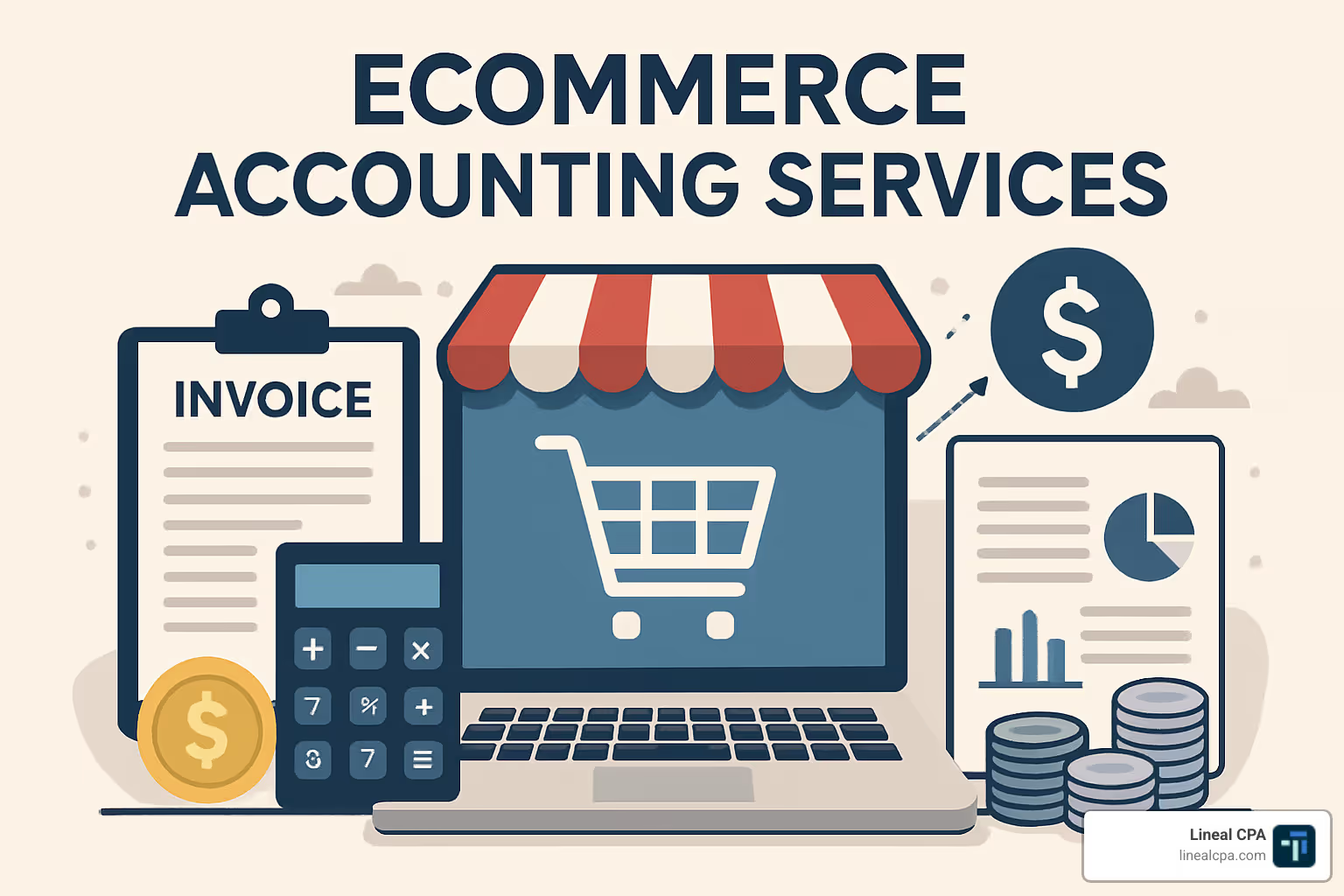
Pricing
Packages start at $399/month, with pricing that scales up based on your revenue and complexity. For many businesses, the time saved and insights gained easily justify the investment — especially when you consider how much founder time gets freed up from bookkeeping tasks.
Acuity
When it comes to specialized ecommerce accounting services, Acuity stands out as a trusted partner for online sellers looking to steer the complex financial landscape of digital commerce. They've built their reputation by helping hundreds of ecommerce businesses not just survive, but thrive.
Key Features
Acuity's approach centers around their comprehensive cloud technology stack that plays nicely with all the major ecommerce platforms. Unlike traditional accountants who might struggle with the unique challenges of online selling, Acuity's team speaks the language of digital commerce fluently.
Their sales tax expertise is particularly valuable in today's complex regulatory environment. If you're an Amazon FBA seller, you already know the headache of potentially having nexus in 22+ states — Acuity's team can help you steer these waters without running aground on compliance issues.
Beyond the day-to-day numbers, Acuity offers Controller and CFO services that lift your financial operations from mere record-keeping to strategic advantage. This matters because according to their data, ecommerce businesses working with Acuity experience a remarkable 313% boost in their survival rate. That's not just accounting — that's business change.
Ideal For
Acuity really shines for ecommerce sellers who lie awake at night worrying about sales tax compliance across multiple states. Their team excels at untangling the web of regulations that can snare unwary sellers. They're also perfect for growing businesses that need more than basic bookkeeping — those ready for strategic financial guidance to fuel their next growth phase.
Customer Feedback
The reviews speak volumes about Acuity's specialized approach. As one client put it: "They understand the unique challenges of selling across multiple platforms and states." This kind of industry-specific knowledge is what separates general accountants from true ecommerce financial partners.
Pricing
Rather than one-size-fits-all packages, Acuity offers custom pricing based on your specific business needs and the level of service required. Their flexible approach means you can start with basic bookkeeping and scale up to full CFO services as your business grows.
For more detailed information about finding the right financial partner for your online store, check out our guide on finding an Accountant for Ecommerce Business.
Whiz Consulting
When your ecommerce business starts hitting those high transaction volumes, you need an accounting partner who won't break a sweat. That's where Whiz Consulting comes in with their scalable ecommerce accounting services designed specifically for businesses dealing with mountains of transactions.
Key Features
- High-Volume Processing: Imagine having a team that handles over 5,000 invoices every month without missing a beat. That's Whiz Consulting's specialty - they're built for businesses that process transactions by the thousands.
- Multi-Channel Reporting: Selling on Amazon, Shopify, WooCommerce, and half a dozen other platforms? Whiz brings it all together in one clear financial picture, so you're not jumping between different reports trying to piece together your business performance.
- Scalable AP/AR Management: As your sales grow, so does your accounts payable and receivable workload. Whiz Consulting grows right alongside you, keeping those crucial cash flow processes running smoothly.
- Inventory Management & Cost Tracking: They don't just count your money - they track your inventory with the same precision, helping you understand exactly what each product is costing and earning you.
Ideal For
Whiz Consulting really shines for established ecommerce sellers who've hit that growth phase where transaction volumes are soaring and your multi-channel strategy is in full swing. If reconciling thousands of transactions makes your head spin, these folks have built their business around solving that exact problem.
Customer Feedback
The reviews tell the story better than we could. One client raved: "Excellent work with invoicing automation and AP & AR processing. Highly recommended!" Another grateful business owner shared, "Your team has been outstanding, and we're truly grateful for the exceptional service you've provided in managing our accounting and bookkeeping."
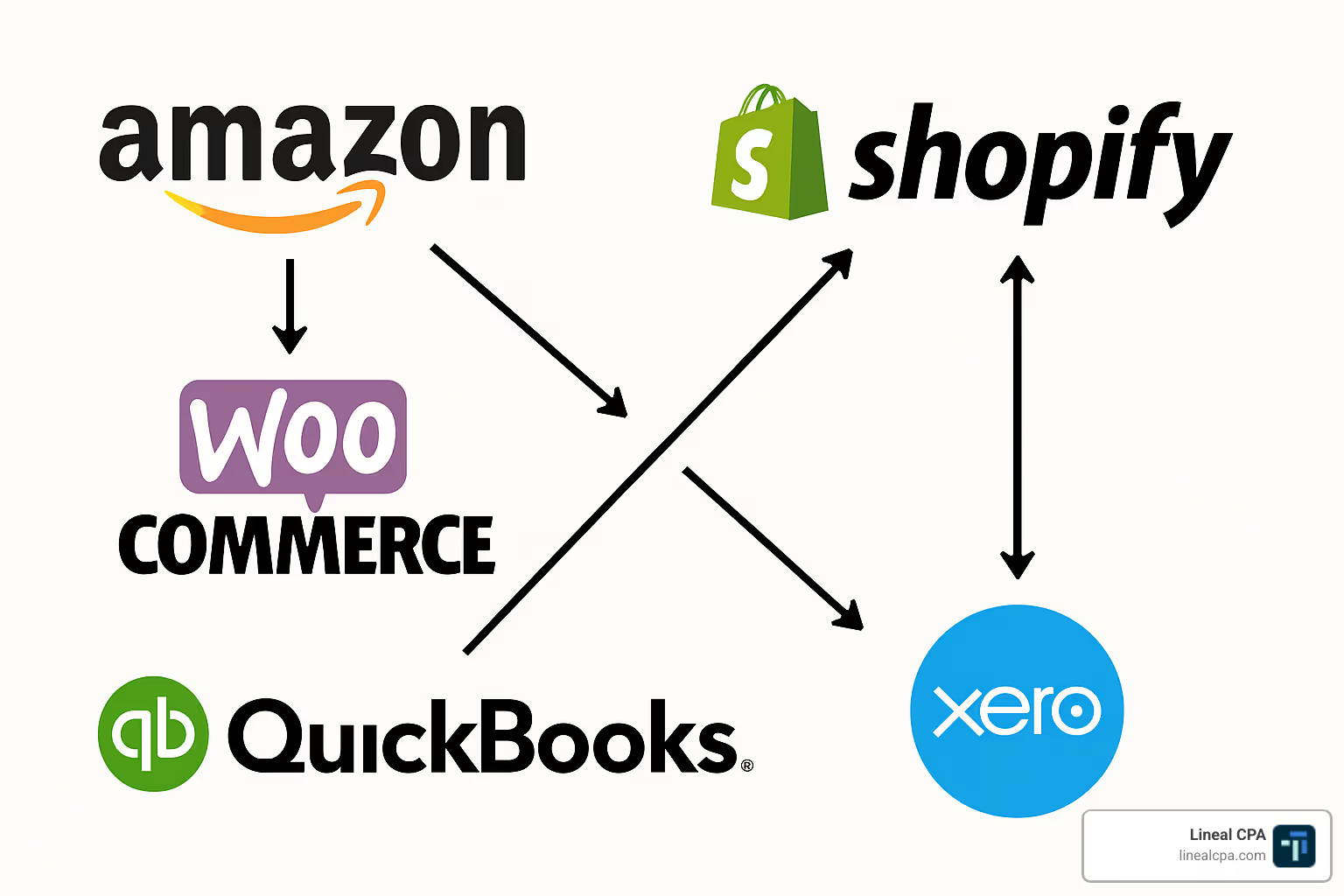
Pricing
Whiz Consulting offers custom pricing based on your transaction volume and specific service needs. Given the high-volume nature of their work, they'll create a package custom to your business scale and complexity.
For ecommerce businesses drowning in transactions and needing a life raft of organization, Whiz Consulting might just be the rescue team you've been searching for. Their ability to handle massive reconciliation loads (15,000+ monthly!) while maintaining accuracy sets them apart in the ecommerce accounting services landscape.
LedgerGurus
When it comes to inventory-heavy ecommerce businesses, LedgerGurus stands out as a trusted accounting partner. They've built their reputation by truly understanding the unique challenges that online retailers face, especially those juggling complex inventory situations.
Key Features
- A2X + QuickBooks Online Expertise: The LedgerGurus team isn't just familiar with these tools — they're certified experts at connecting your ecommerce platforms to QuickBooks using A2X's powerful automation. This integration eliminates the reconciliation headaches that plague so many online sellers.
- Inventory & COGS Focus: Let's face it — tracking inventory costs correctly can make or break your profitability. LedgerGurus specializes in keeping your cost of goods sold accurate across multiple channels and platforms, giving you reliable data for making inventory decisions.
- Virtual Team Model: Geography is no barrier with LedgerGurus' 100% remote accounting team. No matter where your business is based, you'll get responsive support from professionals who understand your ecommerce challenges.
- Award-Winning Workplace: Being named a 2022 Best Utah Company to Work For isn't just a nice trophy for their shelf — it translates to lower staff turnover and more consistent service for you. Happy accountants mean better attention to your books!
Ideal For
LedgerGurus shines brightest when working with inventory-heavy ecommerce accounting services clients who use QuickBooks Online. If you're struggling with product costing, inventory valuation, or just need someone who speaks the language of omnichannel retail, their team hits the sweet spot of technical expertise and practical know-how.
One area where LedgerGurus particularly excels is helping omnichannel retailers maintain consistent accounting practices across different sales platforms. Whether you're selling through your own website, Amazon, or brick-and-mortar locations, they can bring all your financial data together into a cohesive picture.
Customer Feedback
The real testament to LedgerGurus' value comes from their clients. One online seller shared that they had spent "10+ hours unsuccessfully setting up their own accounting integration before outsourcing" to LedgerGurus. Within days, the team had their systems properly connected and running smoothly.
Another client noted, "They understand the nuances of platform fees and inventory reconciliation in a way our previous accountant simply couldn't grasp."
Pricing
LedgerGurus offers custom pricing custom to your business size and complexity. They've developed specialized packages for different ecommerce platforms, recognizing that an Amazon FBA seller has different needs than a Shopify store owner. This customized approach ensures you're not paying for services you don't need while getting the specialized support your particular business model requires.
For businesses looking to scale, LedgerGurus can grow with you, adjusting their service level as your transaction volume and complexity increase.
EcomBalance
Founded by successful ecommerce entrepreneurs who personally sold over $25 million on Amazon, EcomBalance brings something unique to the ecommerce accounting services world — they've actually walked in your shoes as a seller.
Key Features
- Built By Sellers For Sellers: There's a world of difference when your accountants have actually run successful ecommerce businesses themselves. The EcomBalance team understands inventory headaches, platform fee frustrations, and cash flow challenges because they've lived them.
- Free First Month: Unlike most providers, EcomBalance offers a genuinely risk-free way to test their services with a full month of standard bookkeeping deliverables at no cost. This shows their confidence in delivering value right from the start.
- Accrual Sales/COGS Reporting: They follow accounting best practices by reporting sales and COGS on an accrual basis, giving you a much clearer picture of your actual business performance than cash-based methods.
- Process-Driven Approach: Their systematic, repeatable processes ensure your books remain consistent and accurate month after month — no surprises or mysterious changes in methodology.
Ideal For
EcomBalance has positioned itself perfectly for growing ecommerce brands in the 6, 7, and 8-figure revenue range. If you're looking for reliable monthly bookkeeping from a team that truly gets the seller perspective — because they've been sellers themselves — EcomBalance delivers that rare combination of technical expertise and practical experience.
Their approach works particularly well for brands that have outgrown DIY bookkeeping but aren't ready for the expense of a full-time financial team. The fact that they've built their processes specifically for ecommerce operations means they avoid the common pitfalls of general bookkeepers trying to adapt to the unique challenges of online selling.
Customer Feedback
The reviews for EcomBalance speak volumes about their specialized approach. One client shared: "We struggled to find bookkeepers that truly understood our business. EcomBalance has been all of that and much more."
Another long-term client noted it was "Highly recommended from an eCommerce company of 17 years" — the kind of endorsement that carries significant weight in an industry where longevity is rare.
What stands out in their feedback is how clients appreciate working with accountants who understand ecommerce terminology, platform quirks, and inventory challenges without needing extensive explanation.
Pricing
EcomBalance keeps their pricing straightforward and accessible, starting at $399/month for standard bookkeeping services. For businesses with messy books or a backlog of unreconciled transactions, they offer additional Clean Up & Catch Up services starting at $49/month to get everything organized before transitioning to regular maintenance.
Their pricing structure is designed to grow with your business, making them a partner that can scale alongside your ecommerce operation from your first six-figure year through multiple millions in revenue.
Bean Ninjas
For ecommerce businesses using Xero accounting software, Bean Ninjas offers specialized ecommerce accounting services with global capabilities and strategic growth support.
Key Features
- Xero Specialists: Deep expertise in Xero accounting software and its ecommerce integrations.
- Virtual CFO Services: Strategic financial guidance beyond standard bookkeeping.
- Global Client Base: Experience working with ecommerce sellers across multiple countries and currencies.
- Growth Resources: Offers resources like the eCommerce Accounting Playbook (PDF) and detailed guides to support business growth.
Ideal For
Bean Ninjas is well-suited for Xero users, particularly those with international operations or aspirations, who want accounting services that can scale from bookkeeping to strategic CFO support.
Customer Feedback
Clients report an average rating of 4.4/5 based on NPS scores. One client, Dafina Smith from covetandmane.com, shared: "Bean Ninjas offers best-in-class bookkeeping, accounting, virtual CFO, and tax services for 7 and 8-figure ecommerce businesses looking to scale."
Pricing
Custom pricing based on business needs and service level.
A2X Partner Directory
Finding the right ecommerce accounting service can feel overwhelming, which is why many online sellers turn to the A2X Partner Directory. Unlike traditional accounting firms, A2X takes a different approach — they've created a powerful reconciliation platform that connects your favorite ecommerce platforms directly to your accounting software, then help you find certified experts who know how to use it.
Think of A2X as the bridge between your online store and your books. Instead of manually entering thousands of transactions, A2X automatically creates neat, accurate summaries that keep your accounting system clean while maintaining all the detail you need.
"We struggled for years trying to reconcile our Amazon settlements manually," shares one seller. "Our accountant would spend days each month trying to make sense of it all. With A2X and a certified partner, what used to take days now happens automatically."
Key Features
The beauty of the A2X system is its simplicity combined with power. Their platform handles the heavy lifting by automatically posting summarized sales data to your accounting system, completely eliminating tedious manual entry. No more spreadsheet nightmares!
What really sets the A2X Partner Directory apart is their network of certified accountants. These aren't just any bookkeepers — they've demonstrated real expertise in ecommerce accounting and A2X implementation. When you hire one of these professionals, you're getting someone who speaks the language of online selling.
Industry insiders often refer to A2X as "the gold standard in ecommerce accounting" — and with good reason. Whether you're selling on Shopify, Amazon, BigCommerce, eBay, Etsy, or Walmart, they've got you covered with specialized solutions for each platform.
Ideal For
The A2X Partner Directory is perfect if you want the freedom to choose your own accountant while ensuring they have specialized ecommerce technology expertise. It works especially well for sellers who:
- Are tired of messy, error-prone manual reconciliation
- Sell across multiple platforms and need everything in one place
- Want clean, accurate books without spending hours on data entry
- Need an accountant who truly understands ecommerce business models
Customer Feedback
The numbers speak for themselves — A2X boasts over 1,500 reviews with an impressive 4.9/5 star average. Since launching in 2014, they've processed over 700,000,000 orders and reconciled more than 3,000,000 settlements for businesses just like yours.
"A2X saved our sanity," one Amazon seller reports. "Our books are finally accurate, and tax time isn't a nightmare anymore."
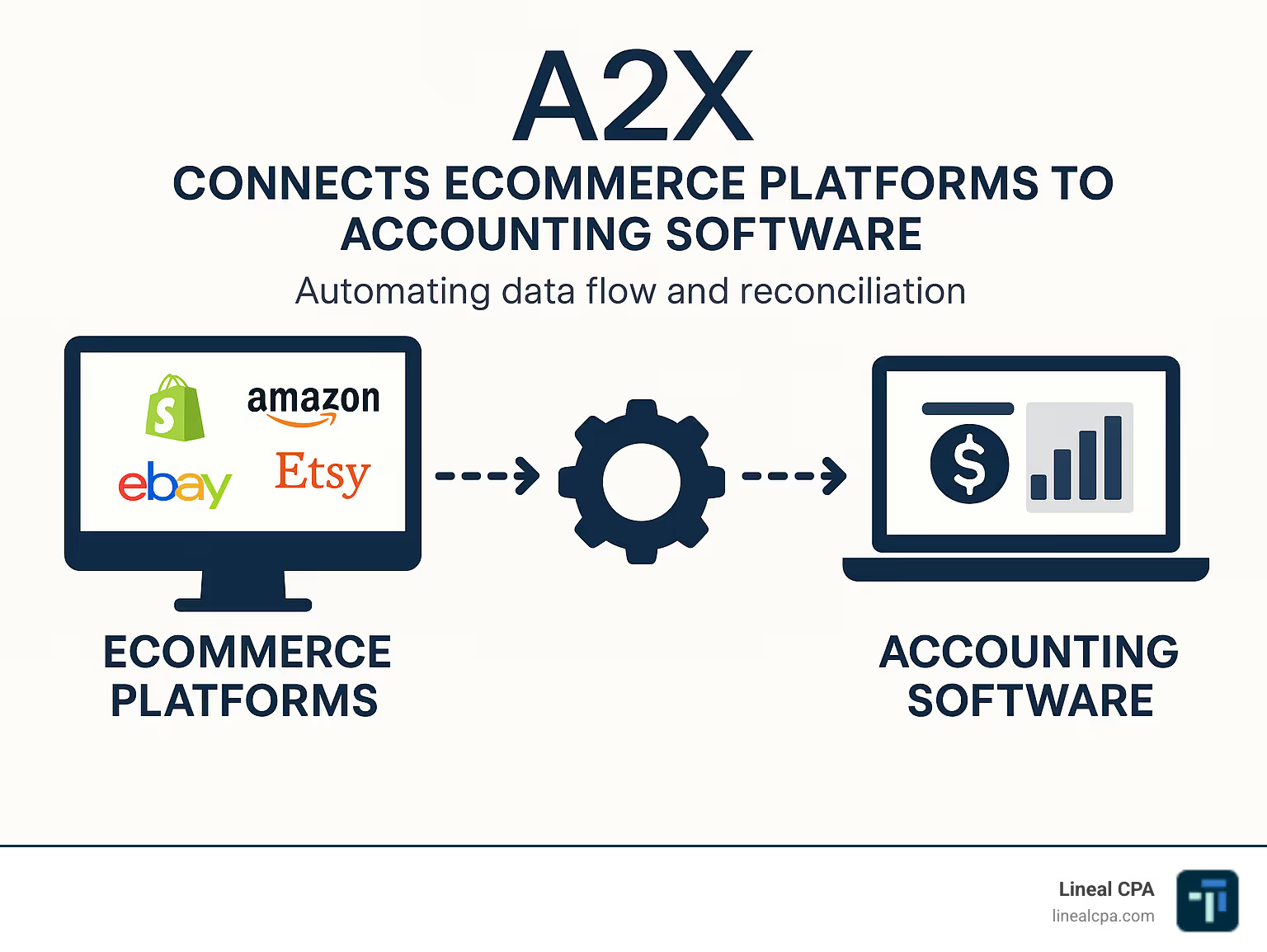
Pricing
While A2X partners set their own rates, keep in mind that certified accountants typically charge premium prices that reflect their specialized expertise. However, most sellers find the investment well worth it when they consider the time saved and the peace of mind that comes with accurate financial data.
The right A2X partner doesn't just connect your systems — they help you understand what the numbers mean for your business growth. When evaluating partners, look for someone who not only understands the technical side but can also provide strategic guidance based on your specific ecommerce business model.
Frequently Asked Questions About Ecommerce Accounting Services
What is sales tax nexus and why does it matter?
Ever feel like sales tax is chasing you across state lines? That's basically what nexus is — a connection between your business and a state that gives them the right to make you collect and remit sales tax.
For online sellers, nexus sneaks up on you in two main ways:
Physical nexus happens when you have inventory, employees, offices, or other physical presence in a state. Think of it as leaving footprints that the tax authorities can follow.
Economic nexus is triggered when you exceed certain sales thresholds in a state — typically around $100,000 in sales or 200 transactions annually, though each state sets its own rules.
The game changed dramatically after the 2018 South Dakota v. Wayfair Supreme Court ruling. Before that, you needed physical presence for states to require tax collection. Now? States can make you collect sales tax based purely on your sales volume there.
"Amazon's FBA service creates a sales tax nexus in 22+ states," as one ecommerce accounting service provider points out. Simply having your inventory sitting in Amazon's warehouses can trigger tax obligations in states you've never even visited!
The plot thickens with marketplace facilitator laws. Sometimes Amazon collects and remits taxes on your behalf in certain states but not others — leaving you with a patchwork of compliance requirements.
This is where specialized ecommerce accounting services become invaluable. They'll conduct a thorough nexus study, handle state registrations, configure your tax collection settings, manage filing deadlines, and reconcile those marketplace-collected taxes. Without this expertise, you're essentially playing tax roulette.
For more details, check out our guide on E-Commerce Tax Accountant services.
How does inventory accounting impact ecommerce taxes?
If you're selling physical products, inventory accounting isn't just a bookkeeping detail — it's a tax requirement with real consequences.
First, understand that the IRS isn't giving you options here. They require businesses with inventory to use accrual accounting for merchandise purchases and sales. This means you can't simply write off inventory as an expense when you buy it (which would be nice, wouldn't it?).
Instead, those inventory costs sit on your balance sheet until the products actually sell. Only then do they become expenses through Cost of Goods Sold (COGS). As one expert plainly states, "Inventory spend is non-deductible until items are sold and must be tracked under an accrual method per IRS rules."
Your choice of inventory valuation method — FIFO (First-In, First-Out), LIFO (Last-In, First-Out), or weighted average — can significantly impact your reported profits and tax liability, especially in times of changing costs or inflation.
Year-end inventory counts aren't just good business practice; they're essential for tax compliance. The IRS expects you to know what you have on hand at the close of your tax year.
Good ecommerce accounting services set up systems that integrate with your sales platforms and warehouses, track inventory across multiple locations, calculate COGS accurately for each sale, document inventory adjustments for damaged goods, and generate the reports you need for both tax filing and strategic decision-making.
What should I look for in an ecommerce accountant?
Finding the right accounting partner is like finding a good business partner — chemistry matters, but specific expertise matters more. Here's what to look for:
Platform expertise is non-negotiable. Your accountant should have hands-on experience with your specific sales channels, whether that's Shopify, Amazon, eBay, or others. Each platform has its own quirks in how it reports sales, fees, and payouts.
Integration know-how saves countless headaches. The right accountant understands how to connect your sales channels, payment processors, and inventory systems to your accounting software without manual data entry.
Specialized knowledge of ecommerce-specific challenges is crucial. Your accountant should understand multi-state sales tax compliance, proper inventory accounting, revenue recognition for online sales, and how to categorize those pesky platform fees.
Proactive advisory separates great accountants from mere bookkeepers. Look for someone who provides forward-looking guidance on cash flow management, inventory optimization, pricing strategy, and growth financing options.
Scalable pricing ensures your accounting can grow with your business. The right service offers tiered options from basic bookkeeping through controller and CFO-level support as you expand.
Technology stack matters tremendously in ecommerce. Verify they use modern cloud-based tools appropriate for online businesses rather than outdated desktop software.
Communication style should match your preferences. Some owners want weekly updates; others prefer monthly reviews with detailed analysis.
As one successful ecommerce entrepreneur advised: "Look for an accountant who asks about your business goals, not just your transaction volume. The right partner will help you use financial data to make strategic decisions, not just file taxes."
At Lineal CPA, we blend NetSuite expertise with strategic finance knowledge to deliver ecommerce accounting services that drive growth while streamlining operations. Our technical accounting team deeply understands online selling challenges and transforms your financial data into actionable insights that help you build a more profitable business.

Conclusion
Finding the right ecommerce accounting service isn't just about keeping your books clean — it's about partnering with experts who understand the unique challenges of selling online and can help transform your financial data into growth opportunities.
Throughout this guide, we've seen how specialized accounting knowledge makes all the difference for online sellers. From untangling the complexities of sales tax nexus to properly valuing inventory across multiple warehouses, ecommerce businesses face financial problems that traditional accountants simply aren't equipped to handle.
The most valuable accounting partner for your ecommerce business will do more than reconcile your Amazon settlement reports or categorize your Shopify fees. They'll provide strategic insights that help you understand which products are truly profitable, which marketing channels deliver the best ROI, and how to optimize your cash flow for sustainable growth.
As your business scales from six to seven or eight figures, your accounting needs become increasingly sophisticated. What worked when you were just starting out won't support you as you expand to multiple sales channels, enter new markets, or prepare for potential investment or acquisition.
At Lineal CPA, we understand this journey. Our team combines deep NetSuite expertise with strategic financial guidance specifically custom for growing ecommerce businesses. We don't just record what happened yesterday — we help you plan for tomorrow with data-driven insights and scalable financial systems.
What sets truly valuable ecommerce accounting services apart:
- The ability to integrate all your sales channels into a unified financial picture
- Experience with the specific tax challenges of marketplace sellers
- Expertise in proper inventory accounting and cost allocation
- Strategic advisory that goes beyond compliance to drive profitability
- Scalable solutions that grow with your business
The right accounting partner doesn't just save you time on bookkeeping — they become a crucial part of your growth strategy, helping you make confident decisions based on accurate financial data.
Whether you're dropshipping on Shopify, selling private label products on Amazon, or building a direct-to-consumer brand across multiple platforms, specialized ecommerce accounting services can transform what might seem like a necessary expense into one of your most valuable business investments.
Ready to turn your books into bucks? Learn more about our managed accounting and bookkeeping services or schedule a free consultation today to discuss how Lineal CPA can support your ecommerce business's financial success.

